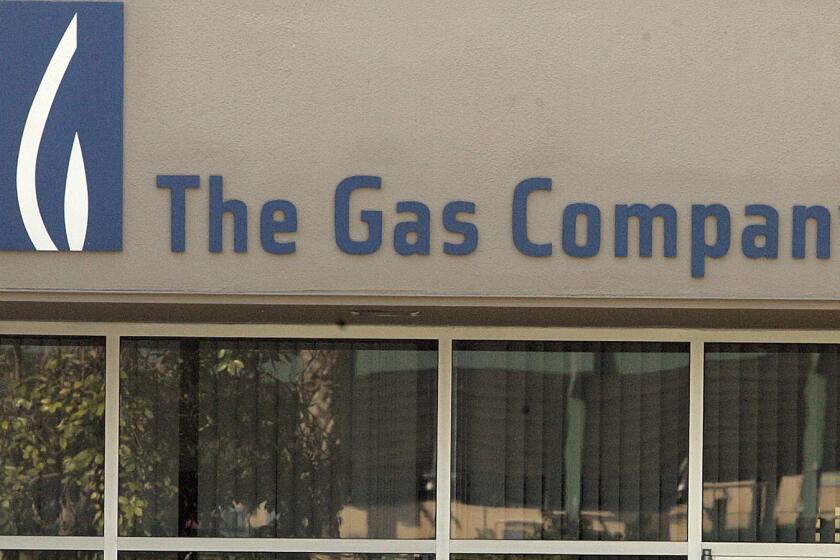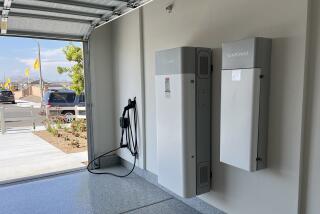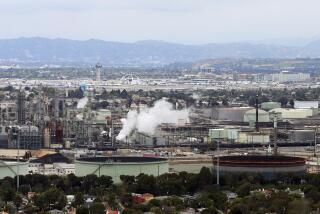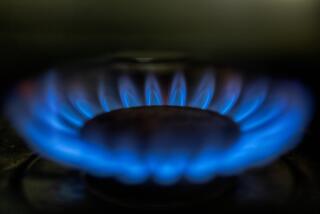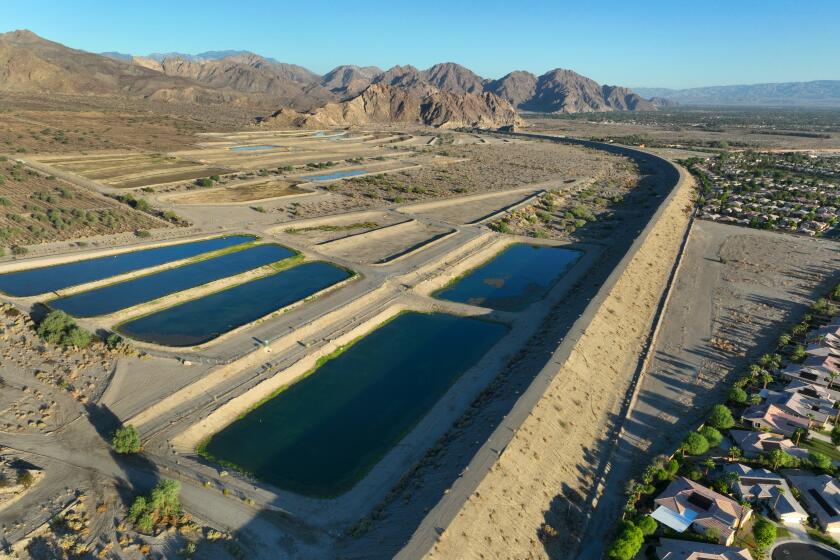California sued over climate change policy — by the nation’s biggest gas utility
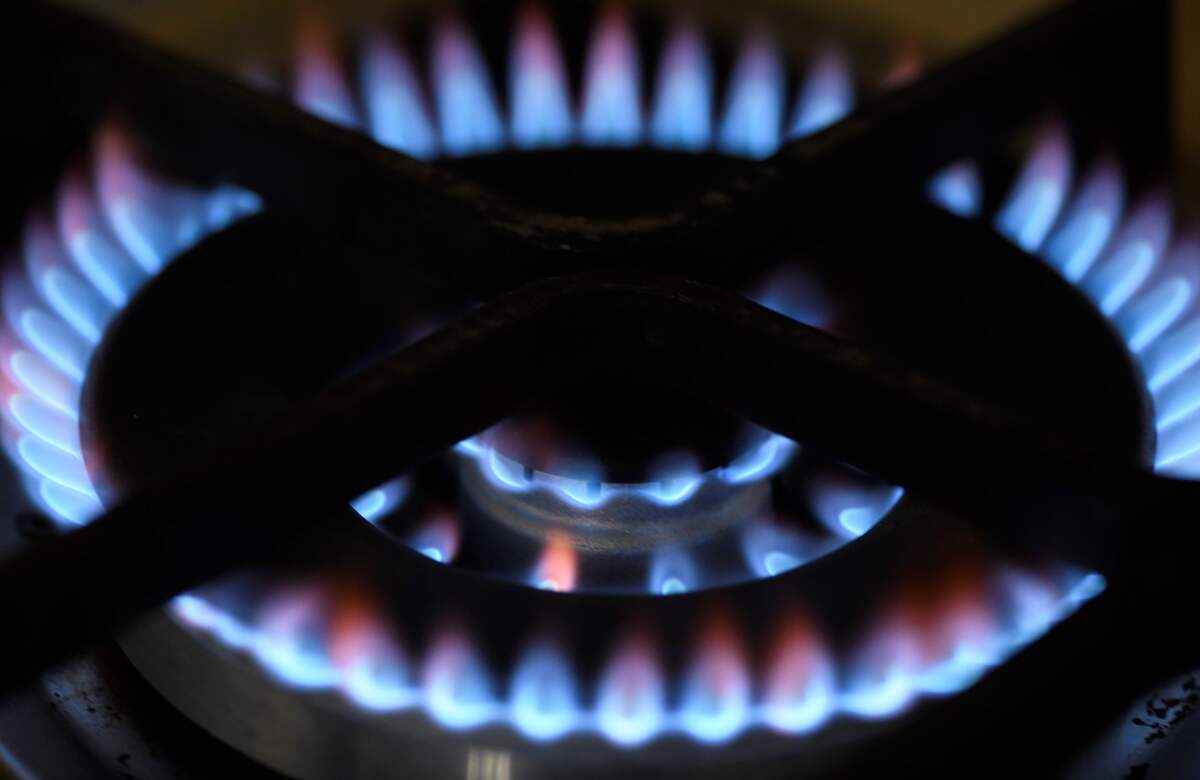
Southern California Gas Co. is taking its battle with state officials over climate change policy to court, arguing in a new lawsuit that the California Energy Commission has failed to promote natural gas as required by state law.
The lawsuit, filed Friday in Orange County Superior Court, is the latest attempt by SoCalGas to shield itself against efforts to phase out gas, a planet-warming fossil fuel used for heating, cooking and power generation. The company, which maintains its headquarters in Los Angeles and is owned by Sempra Energy of San Diego, took in $4.5 billion in operating revenue last year.
A separate lawsuit was filed last week against the state’s Air Resources Board by the California Natural Gas Vehicle Coalition, whose two “charter members” are SoCalGas and Clean Energy Fuels Corp., which joined the gas company in its lawsuit against the Energy Commission. This lawsuit seeks to overturn the newly approved “advanced clean trucks” rule, which is aimed at putting 300,000 zero-emission trucks on the road by 2035.
The legal actions are part of a growing effort by leading players in the natural gas industry to defend themselves as public support increases for aggressive policies to wind down the burning of fossil fuels, not just in California but across the country.
Toward a more sustainable California
Get Boiling Point, our newsletter exploring climate change, energy and the environment, and become part of the conversation — and the solution.
You may occasionally receive promotional content from the Los Angeles Times.
Some clean energy advocates once embraced gas as a “bridge fuel” that could help economies transition from more polluting fuels, particularly coal, to renewables such as solar and wind power.
But climate emissions from gas are now rising faster than coal emissions are falling, according to the Global Carbon Project. Scientists have increasingly found that continued reliance on gas is incompatible with avoiding the worst effects of climate change, including more devastating wildfires, storms and heat waves.
“What you have coming up is a really big year for deciding the fate of gas in California,” said Panama Bartholomy, director of the Building Decarbonization Coalition, an advocacy group that supports replacing gas appliances with electric alternatives. “And I think this is SoCalGas really starting to feel the pressure.”
SoCalGas is America’s largest gas utility, serving 21.8 million customers from the San Joaquin Valley to the U.S.-Mexico border. It operates in a state whose ambitious climate change policies include a requirement for 100% clean electricity by 2045 and a goal of reducing planet-warming carbon emissions to 80% below 1990 levels by 2050.
Your support helps us deliver the news that matters most. Subscribe to the Los Angeles Times.
The company says its pipelines have an important role to play in the clean energy transition. It has argued that trucks and buses powered by natural gas are less polluting than smog-spewing diesel vehicles and that gas heating and cooking help keep energy affordable.
It has also touted the possibility of replacing some of the fossil gas in its pipelines with cleaner fuels such as renewable gas or hydrogen, although there are big questions surrounding the cost, availability and environmental impacts of those fuels.
“Natural gas and renewable gas are clean, affordable, resilient, and reliable sources of energy on which millions of California consumers and businesses depend,” the company’s lawsuit against the Energy Commission states. “Natural gas has played a significant role in reducing greenhouse gas emissions and improving air quality.”
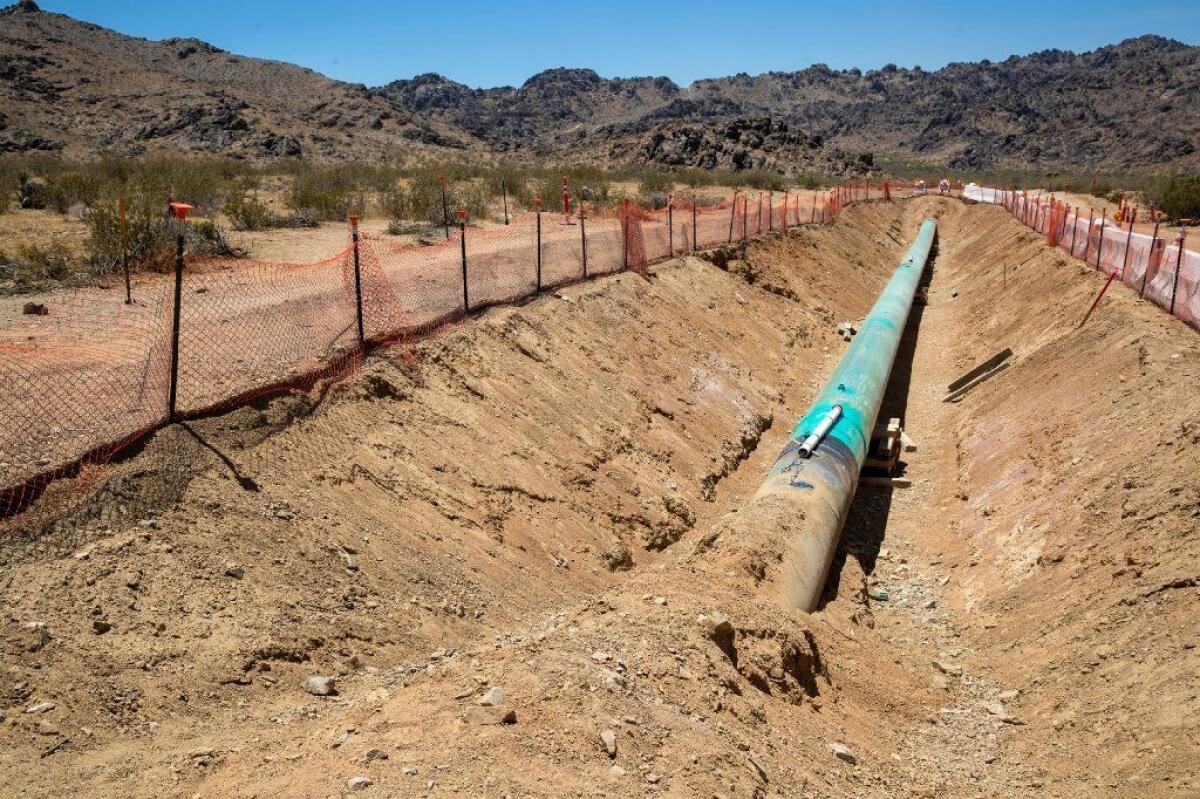
The lawsuit claims state officials are flouting a law requiring them to consider the role gas might play in reducing emissions.
In 2013, lawmakers overwhelmingly approved Assembly Bill 1257, known as the Natural Gas Act. The bill, which was signed into law by then-Gov. Jerry Brown, required the Energy Commission to “identify strategies to maximize the benefits obtained from natural gas as an energy source” every four years.
The commission followed through in 2015, releasing a 120-page report on natural gas. But SoCalGas says the commission failed to meet its obligation in 2019, when instead of a full-fledged report it issued a 22-page appendix to a larger energy policy document.
The lawsuit described the slimmed-down report as “incomplete and legally deficient.”
“Appendix A nominally addressed some of the issues required by statute, but only in the context of phasing out and minimizing the use of natural gas,” the lawsuit argues. “Contrary to the Natural Gas Act, the draft appendix did not ‘identify strategies and options’ to maximize the benefits of natural gas and renewable gas.”
Southern California Gas is engaged in a wide-ranging campaign to preserve the role of its pipelines in powering society.
The Energy Commission declined to comment on the pending litigation.
But the commission wrote in the disputed report that the 22-page appendix “meets the requirements of Assembly Bill 1257.” The appendix describes the role gas has played in the clean energy transition thus far and lists steps the agency has taken to support its use. The document also includes discussion of renewable gas, as required by AB 1257.
What’s not in dispute is that state officials have taken steps to promote “building electrification,” the idea of replacing gas-fueled space heaters, water heaters and stoves with electric alternatives such as heat pumps and induction cooktops.
The Energy Commission approved new efficiency rules, which took effect this year, that make it easier for developers to build all-electric homes with no gas lines. The agency has also approved 21 city- and county-level energy codes that require or encourage developers to build all-electric homes.
Environmental groups say transitioning to all-electric buildings and transportation is the best strategy for reducing emissions in part because California’s power supply keeps getting cleaner. The Energy Commission reported last month that 63% of the state’s retail electricity supply in 2019 came from carbon-free sources.
Curtis Stone has been using induction cooktops for years.
With regulators increasingly frowning on natural gas, the industry may be looking to the political arena for support.
In a letter last month to Marybel Batjer, president of the state’s Public Utilities Commission, three Democratic lawmakers wrote that all-electric buildings “may appear to be good policy, but for families and individuals who are living paycheck to paycheck, a balanced and more affordable approach is needed.”
“The discussion of electrification and its impacts has been growing in recent years in the Legislature, but we are unaware of any specific policy decisions or laws that declare ‘electrification’ as the exclusive policy of the state,” wrote state Assembly members Jim Cooper (D-Elk Grove), Patrick O’Donnell (D-Long Beach) and Blanca Rubio (D-Baldwin Park).

Some experts disagree about gas being the most affordable option. In a recent report for the Energy Commission, the consulting firm E3 concluded that renewable gas is so much more expensive than fossil gas, and its availability so much more uncertain, that all-electric buildings are “likely to be a lower-cost, lower-risk long-term strategy” for reducing climate pollution.
Joining SoCalGas in its lawsuit against the Energy Commission is Clean Energy Fuels Corp., a Newport Beach-based company that owns natural gas fueling stations and was co-founded by the late oil magnate T. Boone Pickens. Company spokeswoman Raleigh Gerber said in a written statement that while Clean Energy Fuels supports California’s climate goals, “achieving those goals does not require minimizing the role of natural gas.”
Also joining the lawsuit were three chapters of the Utility Workers Union of America, collectively representing over 4,000 SoCalGas employees.
“Is the position we take in this lawsuit a defense of the jobs, of the work our members, and allied union workers in the pipe trades, building and construction trades, manufacturing and services do every day? You bet,” the presidents of UWUA Locals 132, 483 and 522 said in a written statement.
One of those union presidents, Local 132’s Eric Hofmann, faced criticism this year when he threatened to bus in hundreds of people to San Luis Obispo with “no social distancing in place” to protest a policy proposal encouraging construction of all-electric buildings. The protest, Hofmann warned city officials, would be “potentially adding to this pandemic.”
Eric Hofmann told San Luis Obispo officials he would bus in “hundreds and hundreds of pissed off people potentially adding to this pandemic.”
SoCalGas and Clean Energy Fuels both declined to comment on the separate lawsuit against the Air Resources Board over its clean trucks regulation, deferring to the California Natural Gas Vehicle Coalition, which filed the suit.
The coalition says air board officials should have incentivized the use of natural gas trucks, which don’t emit nearly as much hazardous air pollution as diesel vehicles but still contribute to climate change. By focusing on a long-term transition to zero-emission electric trucks, the air board is missing an opportunity to reduce pollution more quickly with natural gas, the lawsuit argues.
“We strongly believe that California can and should work on its short AND long term clean air goals simultaneously,” coalition President Thomas Lawson said in an email. “We believe that the Advanced Clean Truck regulation does not deliver much needed near-term smog-forming and [greenhouse gas] emission reductions.”
Clean air advocates disagree.
In a written statement after the regulation was approved, American Lung Assn. President Harold Wimmer said the organization supports “the widespread and rapid shift to zero-emission transportation as vital to improving lung health and saving lives.”
“Too many low-income communities and communities of color are exposed to unhealthy air quality from the diesel truck traffic of nearby freeways, ports, warehouse distribution centers and other diesel hot spots,” Wimmer said. “Everyone deserves to breathe clean and healthy air, and the Lung Association calls on other states to follow this lifesaving policy that moves the trucking sector toward zero-emission solutions.”
SoCalGas gave more than $50,000 last year to the California Natural Gas Vehicle Coalition, newly released disclosure forms show. The company also gave $222,000 to the pro-gas advocacy group Californians for Balanced Energy Solutions, which it helped create, and $24,000 to a nonprofit associated with the California Restaurant Assn., which sued the city of Berkeley over its first-in-the-state gas ban.

